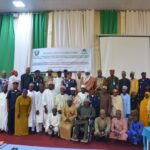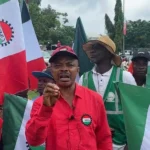Tinubu’s one year in office: Association of Corporate Online Editors’ Public Perception Poll
A majority of Nigerians (68%) do not think President Bola Tinubu’s first year in office has been successful including 42% of those who believe his time in office has been a major failure. Despite this characterization from the majority of Nigerians, President Tinubu still has the backing of a sizeable number of Nigerians to change the fortunes of the most populous African country. Almost half the population of Nigerians (47%) has a positive optics that things will get better not worse. Of note, 8.1% of Nigerians have a strong trust President Tinubu will lead Nigeria out of the woods. A higher number (10%) trust his leadership going forward while (16.2%) are neutral. In contrast, (29.5%) distrust President Tinubu including (36.2%) who strongly distrust his leadership. Despite the negative emotions, more Nigerians think the President deserve the benefit of doubt (45%) think Tinubu’s government will spring a surprise in the future. 55% say it is not expecting anything different in the future.
A plurality of Nigerians (78%) say Tinubu has not satisfied them in his handling of the economy . More than one in four (44%) report they are very dissatisfied, and 34% say they are dissatisfied. (9%) are neutral while almost the same proportion of Nigerians (8.6%) say they are satisfied with his economic policies and its impact on the country’s economy.
A slim population of Nigerians (19%) think President Tinubu in his first year has effectively improved national security and reduced crime. 5% report he has exceeded their expectations. More than one in six Nigerians (62%) say Tinubu has fallen short. Among respondents, a plurality, 31%, say President Tinubu’s security strategy is ineffective, the same population (31%) report his security strategy is very ineffective.
To compound matters for the president, Nigerians are tepid about the fight against corrupt and good governance. Majority think the fight against corrupt under the Tinubu Administration is very unsuccessful. 32% of Nigerians think President Tinubu is very unsuccessful with fighting corruption and good governance, and 39% believe he is unsuccessful on both indexes. A notable 13% say they are neutral while 12% think President Tinubu is successfully tackling corruption and promoting good governance in Nigeria.
On health care, Tinubu underperforms as (32%) rated him very poor, (31%) say he performed poorly. On the positive, only (6%) say Tinubu is changing the nation’s health sector for the better, while (29%) rated him average in improving the healthcare system in Nigeria.
Only 13% of Nigerians say the educational sector has fair well since President Tinubu took office. 64% report that it is worse off, and 33% say his educational policies are very poor.
Many Nigerians also do not think President Tinubu’s infrastructural drive is tangible enough. 64% of Nigerians report that they are dissatisfied with the progress made in infrastructure development such as roads, electricity, water supply, etc under the current administration. Sixteen percent are unsure.
Digging deeper into President Tinubu’s first year in office, a plurality of Nigerian’s (77%) rate the president’s performance in creating job opportunities for Nigerians since taking office as disappointing. 43% of adults think unemployment is very worse under President Tinubu, and 34% say it is doing worse. Almost (16%) of Nigerians are neutral while (7%) rate the president’s performance in creating job opportunities for Nigerians well.
Majorities of Nigerians (57%) think Nigeria’s foreign policy have deteriorated since President Tinubu took office. Although 26% believe the assert Nigeria’s foreign policy remains unchanged in the past year, 13% think foreign policy has gotten better. 4% say things have improved excellently in the past year.
Nearly six in ten Nigerian’s (57%) perceive the president’s communication and transparency as opaque. 32% say President Tinubu is very opaque in communicating policies and decisions to the public, and only 2% believe is very transparent in communicating policies and decisions to the public.
In President Tinubu’s handling of palliatives to cushion the effect of subsidy removal, 76% rate the president’s removal of subsidy and its aftermath as shoddy. 47% of adults nationally say his handling of subsidy removal and its aftermath on the economy is very poor, and 29% report his handling of palliatives is poor (15%) are neutral (7%) rated the subsidy removal policy as good. Only 1% believe Tinubu’s subsidy removal and its impact is very good.
Looking at the demographics breakdown, those in the private sector (42%) have bore the most biting impact of the president’s one year in Office, followed by (35%) in the public sector. 12% of Nigeria residents who are unemployed, followed by students (4%) say they are displeased with President Tinubu’s handling of the country.
The impact of President Tinubu’s administration is greatest on adult Nigerians age 40-69 (72%); followed by 25% of adult Nigerians age 18-39 and 2% of elders aged 70 and above. l
Most male adults (86%) think the president’s one year in office has the greatest impact on them while female adults (14%%) believe adult female Nigerians are the most impacted.
The proportion of Nigerian’s who strongly disapprove of how the president is doing his job on: economy (79%); security (63%); corruption and governance (71%); health care (63%); education (64%); infrastructure (65%); Job creation (77%) and foreign policy (57%) give the most incisive perspective on what and how adult Nigerians feel about President Tinubu’s one year in office.
Results are based on online poll conducted between May 22-26, 2024, with a random sample of 1055 adults, 18+ across the 36 states of Nigeria. For results based on this sample of national adults, the margin of sampling error is +/- 5 percentage points at 95 percent confidence level.
Poll respondents are randomized across Whatsapp, Facebook, X, Instagram and LinkedIn. ACOE obtained samples for this survey using the online presence of its members.










